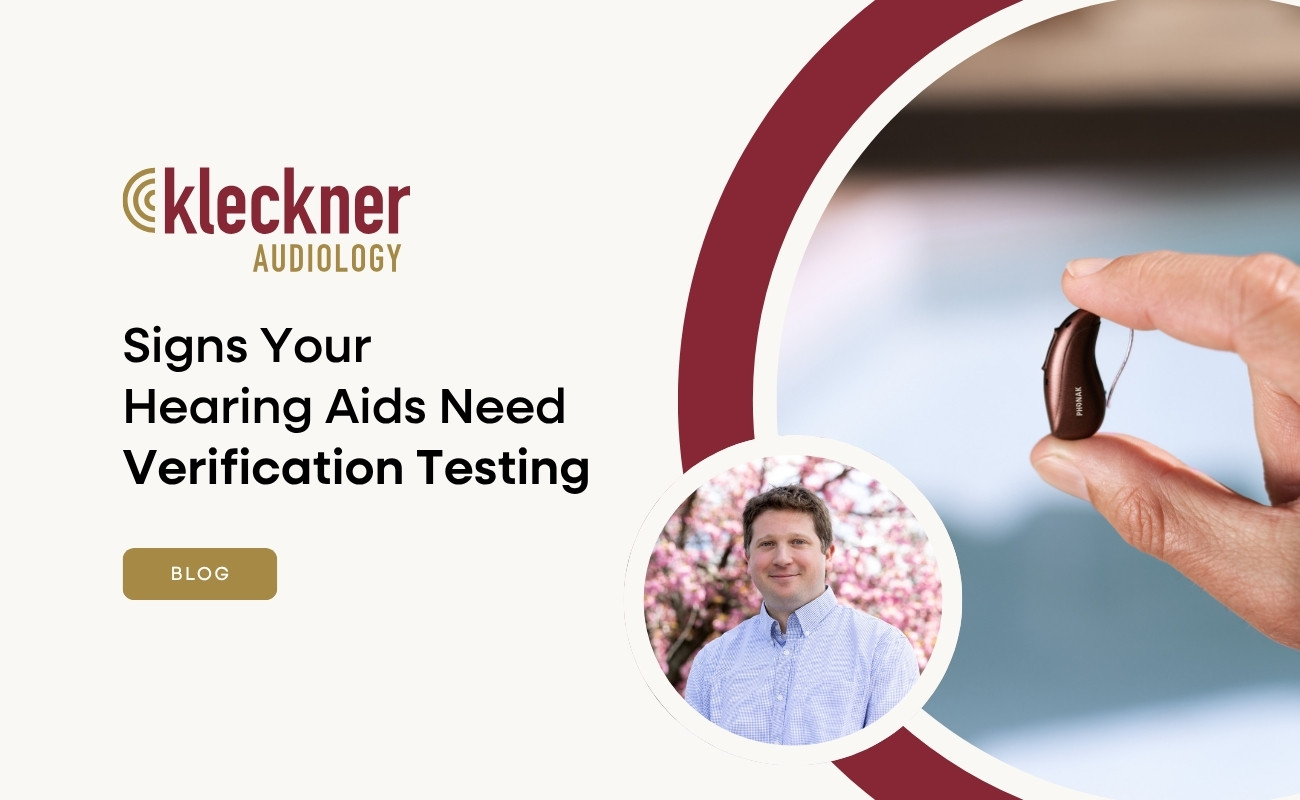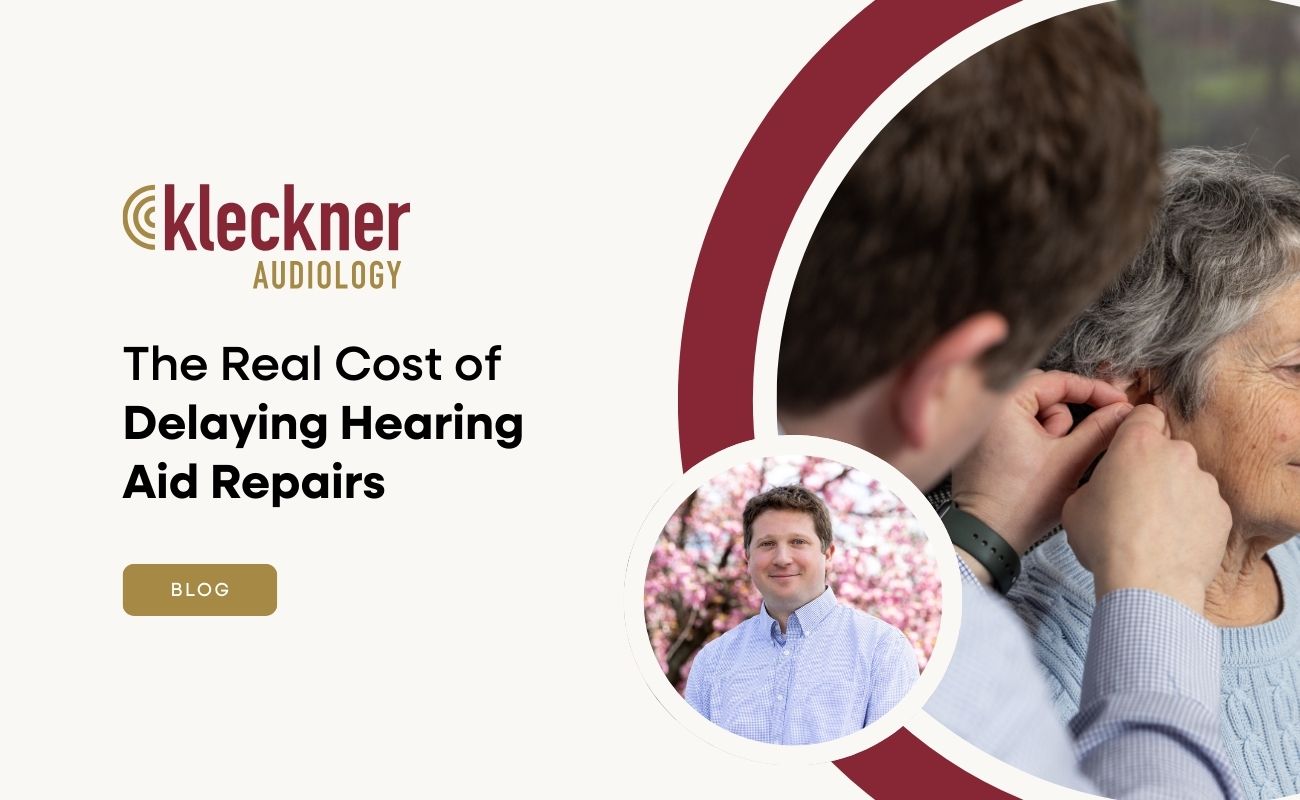Signs Your Hearing Aids Need Verification Testing

If your hearing aids aren't performing as well as they used to, or if you're struggling to hear in situations where you once had clarity, verification testing might be the solution. Hearing aid verification ensures your devices are amplifying sound correctly for your specific hearing loss, and at Kleckner Audiology, we use advanced verification techniques to confirm your hearing aids are working exactly as prescribed.
Many people assume their hearing aids are functioning properly simply because they're turned on and producing sound. But there's a significant difference between hearing aids that are "working" and hearing aids that are precisely calibrated to match your unique hearing profile. Let's explore the warning signs that indicate it's time for verification testing.
Understanding Hearing Aid Verification
Hearing aid verification, also known as electroacoustic analysis, is a diagnostic process that measures whether your hearing aids are delivering the correct amount of amplification across all frequencies. Think of it like a medical lab test that confirms whether a prescribed medication is at the right dosage in your system.
During verification testing, we use specialized equipment to measure the actual sound output from your hearing aids in your ear canal. This objective measurement tells us if your devices match the amplification targets set for your specific hearing loss, rather than relying solely on your subjective feedback about how things sound.
At our Allentown practice, we perform verification testing on all new hearing aids to establish a performance baseline. We also recommend regular verification checks to ensure your devices maintain optimal performance over time.
You're Struggling to Hear in Noisy Environments
One of the most common signs that your hearing aids need verification testing is difficulty understanding speech in noisy settings like restaurants, family gatherings, or busy stores. If background noise seems overwhelming or speech sounds muffled despite wearing your hearing aids, your devices may not be properly calibrated.
Hearing aids should enhance speech while managing background noise appropriately. When verification reveals that certain frequency bands are under-amplified, you miss crucial speech information. Conversely, over-amplification in specific ranges can make environmental sounds distractingly loud while speech remains unclear.
We often see patients who have adapted to suboptimal hearing aid performance without realizing their devices could be working much better. After verification testing and proper adjustments, many people are surprised by how much clearer conversations become, even in challenging acoustic environments.
Your Hearing Aids Sound Different Than They Used To
Have you noticed that your hearing aids don't sound quite right anymore? Maybe sounds seem duller, tinnier, or distorted compared to when you first got them. Changes in sound quality often indicate that your hearing aids have drifted from their original programming or have developed mechanical issues.
Hearing aids are sophisticated electronic devices exposed to earwax, moisture, dust, and daily wear and tear. These factors can affect performance over time. Components may degrade, receivers can become partially blocked, and settings can shift unexpectedly.
Verification testing pinpoints exactly what has changed. The measurements reveal whether your hearing aids are still delivering the prescribed amplification or if adjustments are needed to restore original performance. Sometimes the testing identifies physical issues requiring repair, which we can often handle in our fully equipped repair lab.
You're Experiencing Feedback or Whistling
Persistent feedback (that annoying whistling or squealing sound) is more than just irritating—it's a clear sign that something isn't right with your hearing aids. While occasional brief feedback when inserting or removing hearing aids is normal, constant whistling indicates a problem that verification testing can help diagnose.
Feedback typically occurs when amplified sound leaks out of your ear and gets picked up by the hearing aid microphone, creating a loop. This can happen due to improper fit, earwax buildup, or incorrect programming settings. Verification testing measures whether your hearing aids are over-amplifying certain frequencies, contributing to feedback issues.
During the verification process, we can identify if feedback is caused by excessive gain in specific frequency ranges. We then make precise adjustments to eliminate the whistling while maintaining the amplification you need for clear hearing. Combined with checking the physical fit and condition of your ear canal, verification helps us solve persistent feedback problems.
Your Voice Sounds Strange to You
Many hearing aid users report that their own voice sounds hollow, booming, or unnatural. This phenomenon, called the occlusion effect, can indicate that your hearing aids need adjustment. If your voice sounds significantly different or uncomfortable, verification testing can reveal if your devices are over-amplifying low-frequency sounds.
When hearing aids block your ear canal, your own voice resonates more in that closed space. Properly programmed hearing aids should account for this effect and adjust accordingly. Verification measurements show us exactly what's happening at different frequencies when you speak.
We can use verification results to fine-tune your hearing aids to minimize the occlusion effect while still providing adequate amplification for external sounds. The goal is for your voice to sound natural while you clearly hear others.
You've Recently Had Changes in Your Hearing
Hearing ability can change over time due to age, noise exposure, certain medications, or medical conditions. If you've noticed your hearing seems worse even with your hearing aids, verification testing determines whether your devices are still properly matched to your current hearing levels.
We recommend comprehensive hearing evaluations annually to track changes in your hearing. When your hearing test reveals shifts from previous results, verification testing ensures your hearing aids are reprogrammed to address your current needs accurately.
Without verification, programming changes are based primarily on your feedback about how things sound. While subjective input is valuable, objective measurements provide the precision needed to optimize performance. The combination of updated hearing test results and verification measurements ensures your hearing aids deliver exactly what you need.
Your Hearing Aids Are New
If you recently got new hearing aids, verification testing is not optional—it's part of a proper fitting process. We perform verification on every new hearing aid fitting to confirm the devices are programmed correctly from day one.
Many hearing problems that people attribute to needing time to "adjust" to new hearing aids are actually the result of improper initial programming. Verification removes the guesswork by providing objective proof that your hearing aids meet prescribed targets.
At Kleckner Audiology, we won't send you home with new hearing aids until we've verified they're working correctly. This commitment to thorough fitting ensures you start your hearing journey with properly functioning devices, giving you the best chance for successful hearing aid use.
Schedule Your Verification Testing Today
If you've recognized any of these signs in your hearing aid experience, verification testing can identify the issue and guide appropriate solutions. Our experienced audiologists use state-of-the-art equipment to ensure your hearing aids are performing exactly as they should.
Don't settle for hearing aids that aren't working at their full potential. Contact Kleckner Audiology at 610-435-8299 to schedule a verification appointment. We're conveniently located at 3131 College Heights Blvd #2600 in Allentown, and our team is ready to help you achieve the best possible hearing. Whether your hearing aids are new or you've been wearing them for years, verification testing ensures you're getting the clear, comfortable hearing you deserve.

Dr. Peter Kleckner, Au.D., a seasoned audiologist with experience from prestigious institutions, brings his expertise in comprehensive hearing evaluations and treatments to Kleckner Audiology, where he's been serving patients since 2016.



